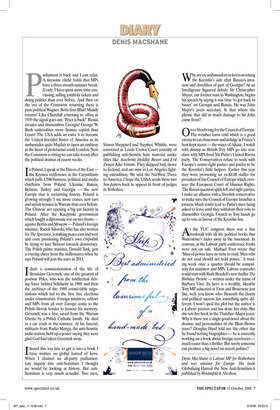P arliament is back and I can relax. A tiresome cliché
holds that MPs have a three-month summer break. If only. I have spent more time canvassing, selling tombola tickets and doing politics than ever before. And then on the eve of the Commons returning there is pure political Wagner. Boris fires Blair! Mandy returns! Like Churchill returning to office in 1939 the signal goes out: ‘Peter is back!’ Russia invades and dismembers Georgia! George W. Bush nationalises more finance capital than Lenin! The USA adds an extra S to become the United Socialist States of America as its ambassador quits Mayfair to open an embassy in the heart of proletarian south London. Now the Commons is sitting we can take it easy after the political dramas of recent weeks.
In Poland, I speak at the Davos of the East — the Krynica conference in the Carpathians which pulls 1,500 business, political and media chieftains from Poland, Ukraine, Russia, Belarus, Turkey and Georgia — the new Europe that is reclaiming history. Poland is growing strongly. I see more cranes, new cars and stylish women in Warsaw than ever before. The Chinese are opening a big car factory in Poland. After the Kaczynski government which fought a diplomatic war on two fronts — against Berlin and Moscow — Poland’s foreign minister, Radek Sikorski, who has also written for The Spectator, is making peace east and west and even promoting Poland’s own Ostpolitik by trying to lure Belarus towards democracy. The Polish prime minister, Donald Tusk, gets a rousing cheer from the millionaires when he says Poland will join the euro in 2011.
Ichair a commemoration of the life of Bronislaw Geremek, one of the greatest of postwar Poles, who was the intellectual driving force behind Solidarity in 1980 and then the architect of the 1989 round-table negotiations which led to the first free elections under communism. Foreign ministers, editors and MPs from all over Europe come to the Polish–Slovak border to honour his memory. Geremek was a Jew, saved from the Warsaw Ghetto by a Polish Catholic family. He died in a car crash in the summer. At his funeral, militants from Radio Maryja, the anti-Semitic radio station, held up a poster saying they were glad God had taken Geremek away.
Iheard this too late to get it into a book I have written on global hatred of Jews. When I chaired an all-party parliamentary inquiry into anti-Semitism I thought we would be looking at history. But antiSemitism is very much actualité. Two men, Simon Sheppard and Stephen Whittle, were convicted at Leeds Crown Court recently of publishing anti-Semitic hate material under titles like Auschwitz Holiday Resort and Evil Zionist Kike Vermin. They skipped bail, drove to Ireland, and are now in Los Angeles fighting extradition. We sent the NatWest Three to America. I hope the USSA sends these two Jew-haters back to appear in front of judges in Yorkshire. Why are ex-ambassadors so keen on taking the Kremlin’s side after Russia’s invasion and Anschluss of part of Georgia? At an Intelligence Squared debate Sir Christopher Meyer, our former man in Washington, begins his speech by saying it was time ‘to get back to basics’ on Georgia and Russia. He was John Major’s press secretary. Is that where the phrase that did so much damage to Sir John came from?
On to Strasbourg for the Council of Europe. The weather turns cold which is a good excuse to eat choucroute and indulge in France’s best-kept secret — the wines of Alsace. I watch with dismay as British Tory MPs go into conclave with MPs from Mr Putin’s United Russia party. The Conservatives refuse to work with Europe’s centre-right parties and prefer to be the Kremlin’s little helpers. Earlier this year they were promoting an ex-KGB staffer for president of the Council of Europe which oversees the European Court of Human Rights. The Russia question splits left and right parties. I make an alliance with a Swedish conservative to make sure the Council of Europe launches a process which could lead to Putin’s men being asked to leave until they withdraw their vote to dismember Georgia. I watch as Tory hands go up to vote in favour of the Kremlin line.
At the TUC congress there was a fine bookstall with all the political books that Waterstone’s hides away in the basement. In contrast, at the Labour party conference books were not on sale. Michael Foot wrote that ‘Men of power have no time to read. Men who do not read should not hold power.’ A reading week once a quarter should be compulsory for ministers and MPs. Labour comrades could start with Ruth Rendell’s new thriller The Birthday Present — written under the name of Barbara Vine. Its hero is a wealthy, likeable Tory MP educated at Eton and Brasenose just like, well, you know who. Beneath the charm and political success lies something quite different. I won’t spoil the plot but the author is a Labour peeress and has done her duty. But she sets her book in the Thatcher–Major years. Why is there not a single good novel about the dramas and personalities of the Blair–Brown years? Douglas Hurd told me the other day he found writing biographies — he is currently working on a book about foreign secretaries — much easier than a thriller. But surely someone can produce a big novel on recent politics?
Denis MacShane is Labour MP for Rotherham and was minister for Europe. His book Globalising Hatred: the New Anti-Semitism is published by Weidenfeld & Nicolson.










































































 Previous page
Previous page